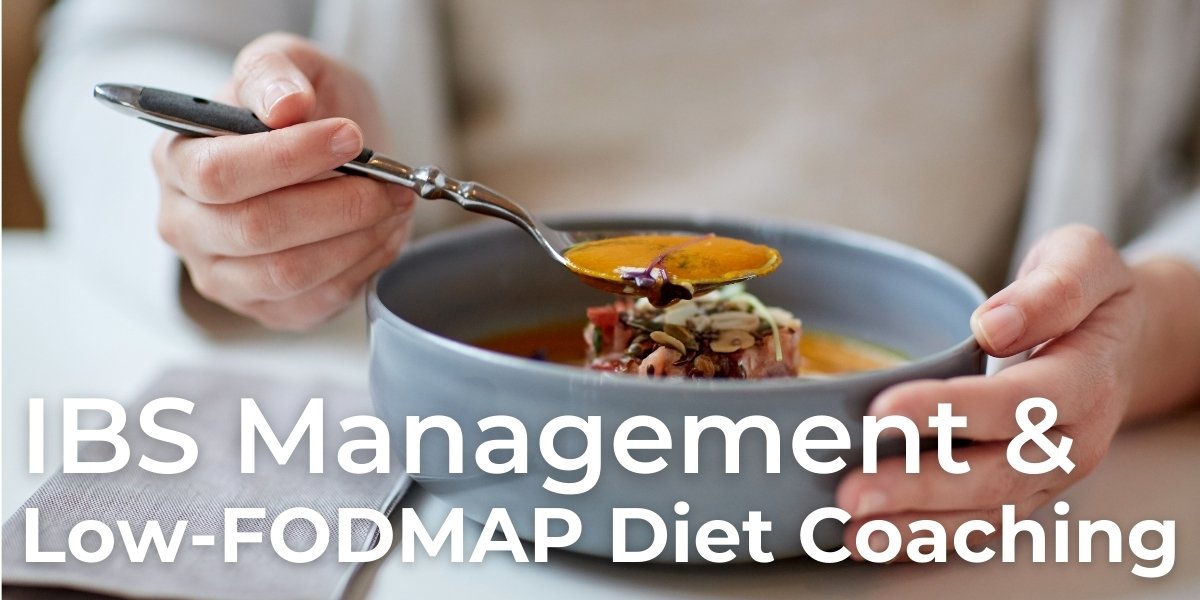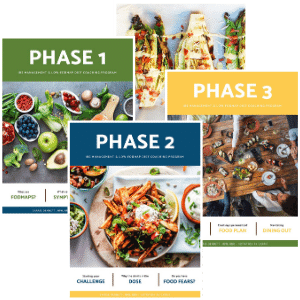
Are IBS symptoms causing you ongoing embarrassment, discomfort and distress — and interfering with living your life? I can help!
How would it will feel to:
- Feel confident about your food choices, rather than wondering (and worrying) if they’re going to cause bloating, abdominal pain, and diarrhea or constipation (or both)?
- Make decisions about how to eat based on solid information about which foods trigger your digestive symptoms, and which ones don’t, rather than trying every new tip or suggestion you see on social media or the internet?
- No longer worry about where the nearest bathroom is everywhere you go?
- Trust yourself to be able to manage your IBS symptoms, even when traveling, dining out and socializing with friends and family at parties and backyard barbecues?
- Find joy and pleasure in your food, without a side helping of fear?
- Finally make peace with food and feel more physically comfortable?

IBS Symptom Management Program
My evidence-based system is based on the latest research about the low-FODMAP diet and IBS and incorporates mindfulness and a holistic view of mind-body health.
What I can help you do:
- Correctly implement all phases of the low-FODMAP diet so you can uncover food triggers for your IBS symptoms.
- Free yourself from searching for answers on the internet — or simply trying to “live with” your symptoms.
- Gain a greater sense of ease about how to eat to reduce your symptoms to a level you are comfortable with.
What’s included (the nuts & bolts)?
 Initial 75-minute session. In this video or phone visit, we’ll take a deep dive into your health and symptom history, as well as your eating patterns and lifestyle habits and how they are influencing the symptoms you are experiencing. You will leave with a better understanding of IBS and what foods might be contributing to your symptoms. Plus, you’ll have a solid plan for beginning Phase 1 of sleuthing out what foods are specifically triggering YOUR symptoms.
Initial 75-minute session. In this video or phone visit, we’ll take a deep dive into your health and symptom history, as well as your eating patterns and lifestyle habits and how they are influencing the symptoms you are experiencing. You will leave with a better understanding of IBS and what foods might be contributing to your symptoms. Plus, you’ll have a solid plan for beginning Phase 1 of sleuthing out what foods are specifically triggering YOUR symptoms.
 30- to 45-minute follow-up sessions. We’ll meet every two weeks to review changes in your symptoms as you work through eliminating then re-introducing high-FODMAP foods and keep you moving confidently through the three phases of the program. I’ll help you build the knowledge and skills you need to continue to make progress, and trouble shoot wherever needed. (Note: Many of my IBS patients alternate between shorter and longe follow-up sessions, depending on where they are in the three phases and whether they’re also working with me on food and body concerns.)
30- to 45-minute follow-up sessions. We’ll meet every two weeks to review changes in your symptoms as you work through eliminating then re-introducing high-FODMAP foods and keep you moving confidently through the three phases of the program. I’ll help you build the knowledge and skills you need to continue to make progress, and trouble shoot wherever needed. (Note: Many of my IBS patients alternate between shorter and longe follow-up sessions, depending on where they are in the three phases and whether they’re also working with me on food and body concerns.)
 Free e-books. You’ll get information-packed e-books to help you better understand IBS and guide you through the phases of the program. You’ll also get a collection of low-FODMAP recipes plus resources to help you meal plan..
Free e-books. You’ll get information-packed e-books to help you better understand IBS and guide you through the phases of the program. You’ll also get a collection of low-FODMAP recipes plus resources to help you meal plan..
 Tools and worksheets. After each session, I’ll email you specific recommendations based on what we talked about, as well as additional information to help you continue progressing on your journey to understanding your food triggers and reducing your symptoms while still nourishing yourself well.
Tools and worksheets. After each session, I’ll email you specific recommendations based on what we talked about, as well as additional information to help you continue progressing on your journey to understanding your food triggers and reducing your symptoms while still nourishing yourself well.

Ongoing support. In between sessions, you can instant message me with any questions or concerns, or simply to give me a heads-up about things you want to talk about during our next session. I’ll also review your (optional) online food journal and offer feedback and support between sessions.
Your Journey Roadmap
(The Four Phases)
(The Four Phases)
Phase 0: Marking Your Starting Point
Your journey begins before we even have our first session. In addition to completing a comprehensive intake questionnaire about your nutrition and health history, you’ll also do a baseline assessment of your current symptoms.
Phase 1: Clearing the Decks
As we begin our work together, you’ll learn more about what foods or parts of foods might be causing your IBS symptoms — and why. We’ll discuss your symptom history and create your personalized plan for temporarily clearing high-FODMAP foods out of your meals and snacks.
Phase 2: Reintroduction
Variety is the spice of life, and a varied diet is important for pleasure as well as for nutrition and health. We’ll reintroduce high-FODMAP foods back into your meals and snacks in a precise, structured way so we can uncover exactly which foods, and which amounts are triggering symptoms. You’ll learn which foods you can welcome back permanently with open arms, which you can still enjoy in moderation, and which you need to continue to avoid when you want to avoid a symptom flare-up.
Phase 3: Personalizing Your Plan
Once you have a baseline understanding of which foods you love also love you back (and which don’t), we’ll work on fine-tuning your list of “Yes,” “Sometimes” and “Not the best idea” foods, doing any troubleshooting and laser-focused experimentation with specific foods. We’ll also build strategies for managing symptoms with a minimum of restrictions, so you can confidently eat in virtually any situation, including restaurants and social gatherings.
My Approach & Philosophy
I am a weight-inclusive, non-diet dietitian who uses a Health At Every Size approach, and I bring those perspectives into my work helping people manage their IBS symptoms. As a certified Intuitive Eating counselor and a licensed Be Body Positive facilitator, I aim to help you feel confident and empowered, and to help you break free of food fears and feel better in your body. I’ll collaborate with you to develop an individualized plan for nutrition and self-care while providing a safe, non-judgmental environment for you to discuss any food and body concerns.
Ready? (Or think you might be?)
I’d love to chat with you. Click on the button below to request a 20-minute Gut Check Consult so we can talk more about where you are today with your symptoms, what you’ve tried before, and how I can help you get lasting symptom relief. We’ll talk about what’s worked (or not worked) for you in the past, and I can answer any questions about my program that aren’t covered in the FAQ below!
Frequently Asked Questions
You can ask me questions about the program and how I work during our 20-minute Gut Check Consult (or email me via the “Contact Me” link below the FAQ), but you might find the answer to your question below!
Have another question? Contact me.
